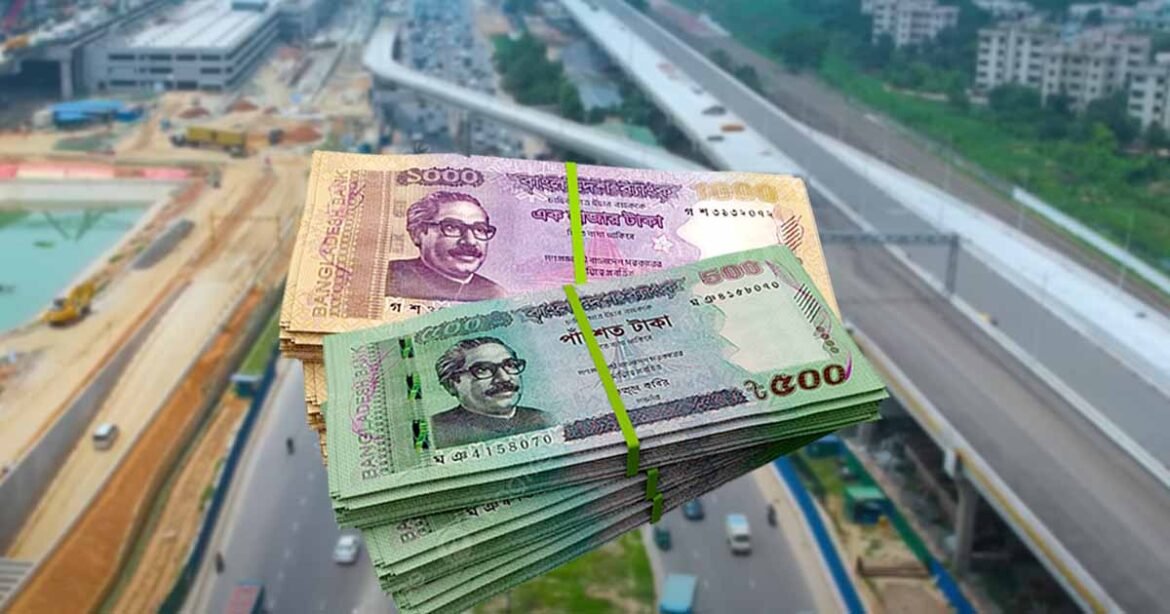Bangladesh has made the first payment in taka for a project that is primarily funded by foreign loans, introducing a new method for better protecting foreign exchange reserves.
Bangladesh used its own currency BDT (Bangladeshi Taka) for the first time to settle its payment for the Dhaka-Ashulia elevated expressway project financed by foreign debt. A new initiative to better preserve Bangladesh’s foreign currency reserves has been launched, relieving some of the strain on the country’s foreign reserves in the process.
Bangladesh convinces Chins to receive payment in Taka
The Dhaka-Ashulia Elevated Expressway construction project launched at the end of last year. The project entails building a 24-kilometer elevated expressway between Dhaka and Ashulia at a cost of Tk 17,653 crore, or approximately $1.2 billion. China is providing a loan for 85% of the cost at 2% interest, payable over twenty years with a five-year grace period. The remaining 15% is covered by the government of Bangladesh.
Loan funds are being disbursed in US dollars from the Export-Import Bank of China to the Chinese contractor, China National Machinery Import & Export Corporation. The government of Bangladesh will reimburse the bank.
As for the remaining 15% of the Bangladesh government, the project director, Shahabuddin Khan, stated, “We convinced them (the contractor) to accept the bill in the taka as they will have some spending to do in Bangladesh.”
“They accepted our proposal taking into consideration the present context,” he said.
According to him, more than 250 Chinese nationals, including engineers and employees, and 1,000 Bangladeshis are currently employed on the project.
Why payment in Taka?
In order to address a demand-supply imbalance on the foreign exchange market, the Bangladesh Bank has sold foreign currencies and allowed the taka to depreciate. The foreign exchange reserves fell to $29.92 billion on May 31 from $42.20 billion on the same date last year, according to data from the central bank, as a result of higher import expenditures relative to export and remittance receipts.
The construction was inaugurated by Prime Minister Sheikh Hasina in November of last year, and the initial payment of Tk 1,339 crore ($130 million) was made in October. The Bangladeshi government’s share of the total was Tk 34 billion. The next payment of Tk 600 crore ($58.25 million) will be made in June, with the Bangladesh government contributing Tk 90 crore.
Shahabuddin asserted, “This will continue until the situation pertaining to the foreign currency reserves improves.”
Benefits of the Dhaka-Ashulia Elevated Expressway
The expressway project report predicts a 0.217% increase in the nation’s gross domestic product (GDP). More than five percent of the initiative has been implemented, and by the end of June it will reach eight percent.
“We have a target to complete 30 per cent of the overall project by next fiscal year,” Shahabuddin said.
Once completed, the expressway will link Hazrat Shahjalal International Airport with Abdullahpur, Ashulia, Baipail, and the Dhaka Export Processing Zone on the Nabinagar-Chandra highway, allowing for rapid access to and from the capital. It will connect Dhaka’s Jatrabari Police Station to Kutubkhali.
Over four crore people from thirty districts, including districts in the north, will benefit from the expressway because it will facilitate and expedite the movement of people and products.
Md Masudul Haque, joint secretary of the Economic Relations Division’s Foreign Aid Budget and Accounts section, affirmed that this is the first bill payment in the local currency for a project funded primarily by foreign loans. He said, “If the same is done in all the national projects of the country, it will be positive for the country and will help save some foreign exchange.”
According to Prof. Selim Raihan, executive director of the South Asian Network on Economic Modeling, this was made feasible through fruitful negotiations with the contractor.
He said, “It is a positive initiative and it will help reduce pressure on the forex reserve.” “This initiative will also help money circulation and the local suppliers will benefit entirely. If this arrangement can be introduced to the projects funded by foreign loans, it will bring a positive impact on the economy in the long run,” he added.
To conclude, Bangladesh has taken a significant step toward safeguarding its foreign exchange reserves by making the first payment for the Dhaka-Ashulia elevated expressway project in its local currency, the Bangladeshi Taka (BDT). This action is intended to rectify the demand-supply imbalance in the foreign exchange market and alleviate some pressure on the nation’s reserves. This initiative is viewed favorably because it will aid in the circulation of funds within the country and may have long-term economic benefits if applied to other projects funded by foreign loans.


